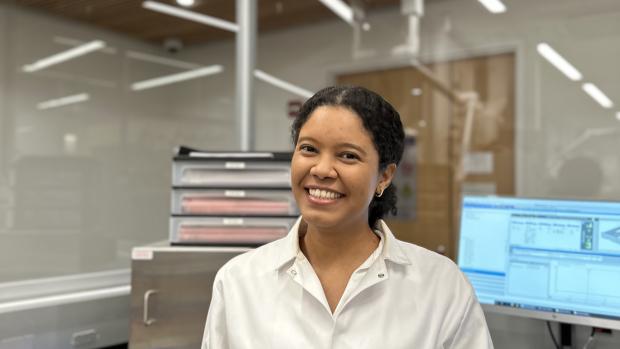Making a splash in the world of water systems
Ph.D. candidate Luana de Brito Anton garners a prestigious scholarship from the New York Water Environment Association

Luana de Brito Anton, a fourth-year doctoral student in NYU Tandon’s Department of Civil and Urban Engineering
A water treatment plant might seem like an odd place to have an epiphany, but that’s just what happened to Luana de Brito Anton, a fourth-year doctoral student in NYU Tandon’s Department of Civil and Urban Engineering.
De Brito Anton, who is specializing in environmental engineering with a focus on water resources, was an intern at Sweden’s Görväln Water Treatment Plant, which provides clean water to several municipalities north of Stockholm, when it struck her: there were few things more exciting than conducting research and seeing with your own eyes the results actually benefiting people.
After earning a bachelor’s degree in chemical engineering from the Federal University of Amazonas in her native Brazil and an M.Eng. from the National Graduate School of Chemistry in France, de Brito Anton headed to Brooklyn, where she is now mentored by Institute Associate Professor Andrea Silverman — whose eponymous lab explores water quality, wastewater treatment, and urban flooding, with an overarching goal to protect public health and environmental quality — and Dr. Jennifer Apell, an environmental chemist working for the U.S. Army Corps of Engineers.
There, de Brito Anton studies the light-driven degradation (also known as photodegradation) of pesticides in water — an important phenomenon since using pesticides benefits society by improving crop yields and ensuring food supply yet at the same time causes concerns when agricultural runoff leads to pesticides entering surface waters, where they may pose hazards to aquatic organisms and humans.
Her aim is to better understand how pesticides photodegrade in a wide range of environmental and engineered systems and to ultimately harness the power of photodegradation to develop better water-treatment systems using artificial light. She points out, as well, that such an understanding could also contribute to the design of compounds with desired photodegradation kinetics and pathways, leading to more sustainable agricultural practices in the long term.
Her work recently won her the prestigious 2023 Graduate Scholarship from the New York Water Environment Association (NYWEA) metropolitan chapter.
“Luana is doing remarkable research with the potential to make a significant impact,” said Silverman, “but in addition to her scientific rigor, creativity, and academic ability, she has exhibited a commendable commitment to teaching and mentoring younger students. She is a credit to my lab and an asset to our field.”
Magued Iskander, the Chair of the Department of Civil and Urban Engineering, added: “I couldn’t be prouder that the NYWEA has given Luana this well-deserved honor. I predict that she will make a significant impact with her research and will continue providing us with reasons to be proud long after she earns her Ph.D.”




